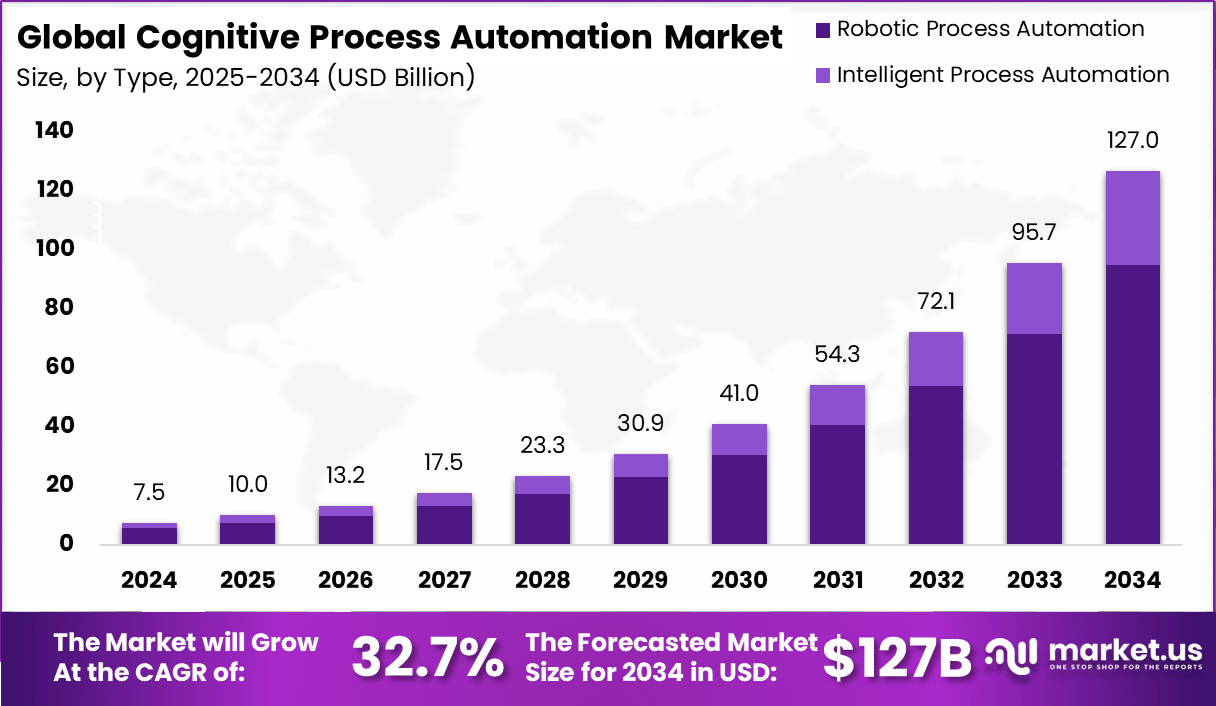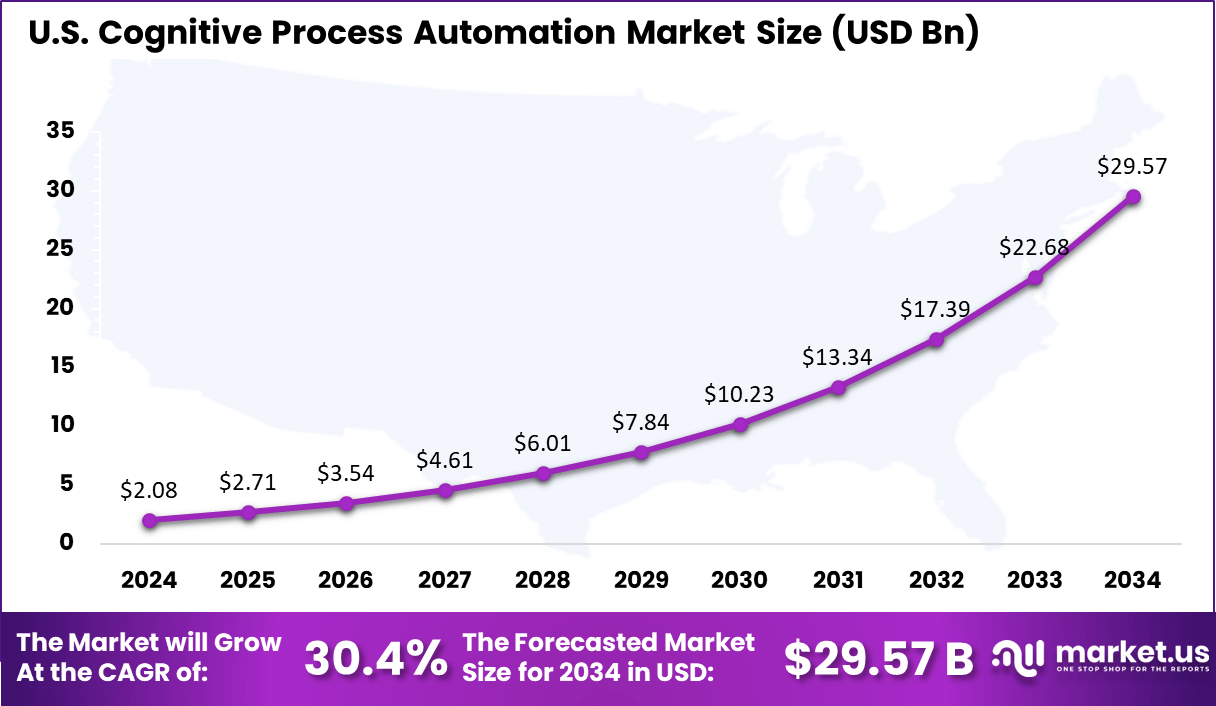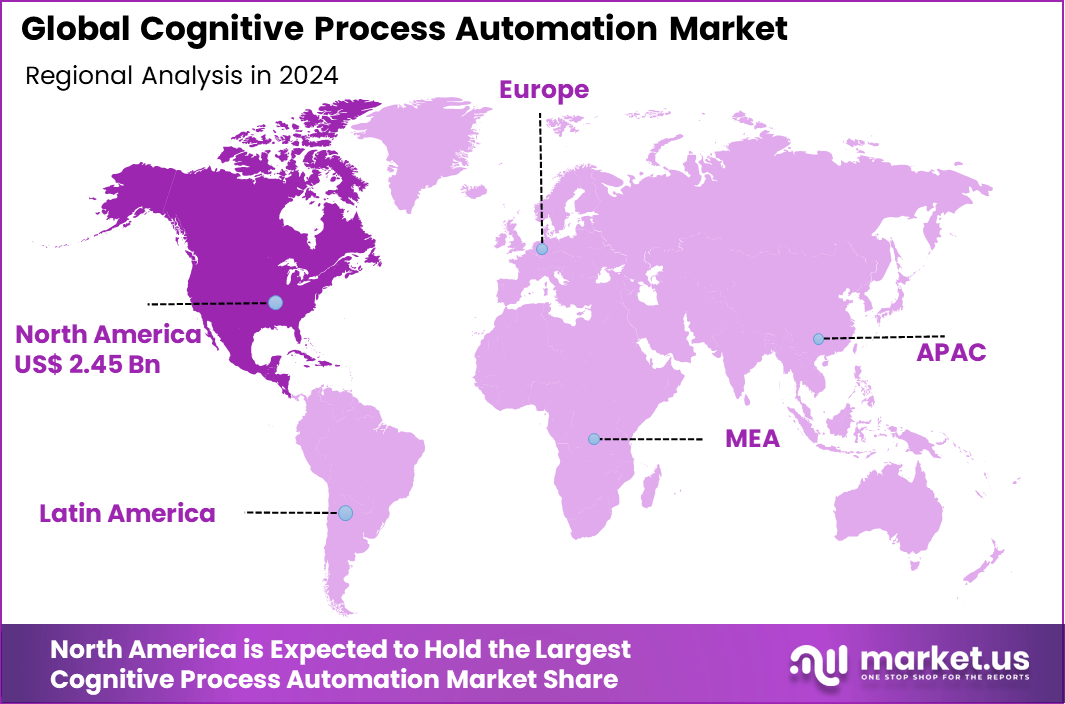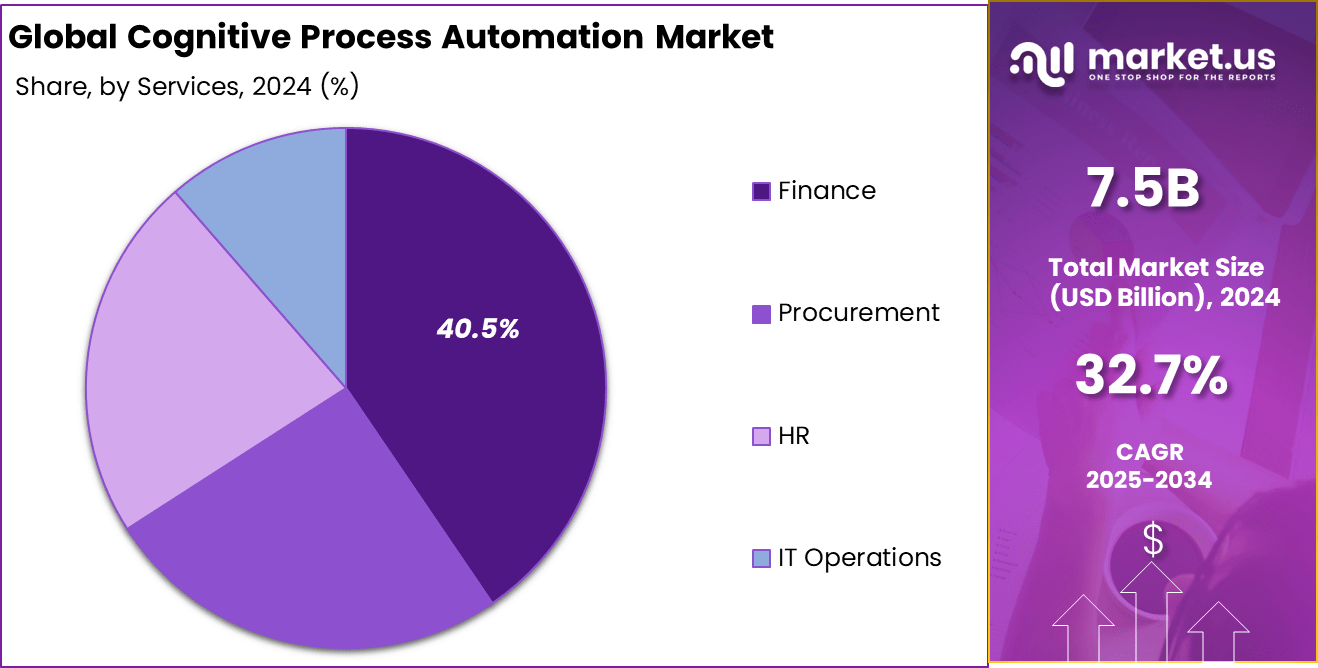Global Cognitive Process Automation Market Size, Share Report By Type (Robotic Process Automation, and Intelligent Process Automation), By Services (Finance, Procurement, HR, and IT Operations), By Application (Machine Learning, Natural Language Processing, Pattern Identification, Biometrics, Optical Character Recognition, and Others), and By Industry Vertical (BFSI, IT & Telecommunication, Transportation & Logistics, Retail & E-commerce, Media & Entertainment, Manufacturing, Healthcare & Life Sciences, Energy & Utilities, and Others), By Region and Companies - Industry Segment Outlook, Market Assessment, Competition Scenario, Trends and Forecast 2025-2034
- Published date: July 2025
- Report ID: 153973
- Number of Pages: 258
- Format:
-
keyboard_arrow_up
Quick Navigation
Report Overview
The global Cognitive Process Automation market size accounted for USD 7.50 billion in 2024 and is predicted to increase from USD 10.00 billion in 2025 to approximately USD 127.00 billion by 2034, expanding at a CAGR of 32.70% from 2025 to 2034.

The cognitive process is becoming increasingly popular in automation organizations as it helps to complete the tasks more quickly and accurately by automatic and accurately by automating document analysis, data entry, decision making and customer aid. By automating the tasks that were traditionally done by humans, it increases efficiency and productivity. Additionally, it helps customizing resource usage and reduces the requirement of additional employees in some areas, driving market growth.
The global Cognitive Process Automation (CPA) industry is experiencing rapid growth, driven by the increasing demand for more efficient and error-free automation solutions. CPA combines AI, machine learning, NLP and RPA to automate cognitive functions that were traditionally performed by humans. These functions include document analysis, data entry, decision-making, and customer service – significantly enhancing operational efficiency and reducing costs.
Cognitive Process Automation (CPA) is particularly beneficial in areas such as banking, healthcare, insurance and manufacturing, where large versions of data need to be processed quickly and accurately. By increasing productivity and adaptation of resource allocation, CPA reduces the dependence on human labor for repetition and time -taking tasks.
Key Takeaways
- In 2024, the Robotic Process Automation segment held a dominant market position, capturing more than a 65.7% share of the Global Cognitive Process Automation Market.
- In 2024, Finance Services held a dominant market position, capturing more than a 40.5% share of the Global Cognitive Process Automation Market.
- In 2024, the Machine Learning segment held a dominant market position, capturing more than a 26.7% share of the Global Cognitive Process Automation Market.
- In 2024, the BFSI segment held a dominant market position, capturing more than a 25.5% share of the Global Cognitive Process Automation Market.
- The US Cognitive Process Automation Market was valued at USD 2.08 Billion in 2024, with a robust CAGR of 30.4%.
- In 2024, North America held a dominant market position in the global Cognitive Process Automation Market, capturing more than a 32.7% share.
U.S. Market Size
The US Cognitive Process Automation Market was valued at USD 2.08 Billion in 2024, with a robust CAGR of 30.4%. The US Cognitive Process Automation (CPA) is seeing rapid adoption in market industries, which is driven by the need for more efficient, cost -effective operations. Cognitive procedures help automation solution organizations increase operational efficiency, reduce errors and adapt resource allocation.
As companies improve productivity and maintain competition, CPA is becoming an integral part of their digital change strategies. The market is particularly stronger in areas such as banking, healthcare and manufacturing, where high sections of data and regular functions are common. Increasing attention to increasing interest and reducing operational costs in automation technologies is the major factors running CPA expansion in the US market.

In 2024, North America held a dominant market position, capturing more than a 32.7% share and generating approximately USD 2.45 billion in revenue in the global Cognitive Process Automation (CPA) market. The region’s leadership can be attributed to the rapid integration of AI-powered process automation tools across industries such as finance, healthcare, and manufacturing.
A strong digital infrastructure, early enterprise adoption of intelligent automation, and high cloud penetration have created a fertile ground for CPA implementation. The demand for reducing operational costs, improving decision-making accuracy, and addressing labor shortages has further driven the region’s widespread adoption.

Type Segment Analysis
In 2024, the Robotic Process Automation segment held a dominant market position, capturing more than a 65.7% share of the Global Cognitive Process Automation Market. This dominance can be attributed to widely adopting RPA in various industries, especially in finance, healthcare and manufacturing, where business wants to automate repetitive and rules-based tasks.
RPA organizations helps to reduce operations by automatic by automating data entry, document processing and simple decision making, leading to better efficiency and accuracy. In addition, RPA devices are highly scalable and can be integrated with existing systems, with which they appeal to companies that are looking to quickly increase their operation of without overhaling infrastructure.
Services Segment Analysis
In 2024, the Finance segment held a dominant market position, capturing more than a 40.5% share of the Global Cognitive Process Automation Market. The growing reliance on AI-powered solutions in this sector significantly contributes to this dominance.
Financial institutions are increasingly adopting cognitive automation for tasks such as financial reporting, fraud detection, risk assessment, and transaction processing. These applications streamline processes, enhance decision-making, and ensure compliance with regulatory standards.
Moreover, the finance industry’s vast data volumes and complex operations make it an ideal candidate for automation, as cognitive computing can analyze and process data far more efficiently than manual methods. The need for real-time data processing and predictive analytics to assess financial risks and opportunities further accelerates the adoption of CPA within this sector, ensuring its leadership position in the market.

Application Analysis
In 2024, the Machine Learning segment held a dominant market position, capturing more than a 26.7% share of the Global Cognitive Process Automation Market. Machine learning’s dominance can be attributed to its ability to enable self-learning automation, predictive analytics, and intelligent decision-making, which are highly valued by businesses seeking to optimize operations and reduce human intervention.
ML models continuously improve through exposure to more data, making them increasingly effective over time. Machine Learning capability is particularly valuable in industries such as healthcare, finance, and customer service, where real-time data analysis and automated decision-making can improve efficiency and customer experiences.
ML’s ability to handle complex tasks like fraud detection, customer sentiment analysis, and personalized recommendations further strengthens its position in the CPA market. As businesses continue to seek intelligent, adaptable solutions, ML remains a key driver of growth in the cognitive process automation space.
By Industry Vertical Analysis
In 2024, the BFSI segment held a dominant market position, capturing more than a 68.4% share of the Global Cognitive Process Automation Market. This sector has heavily adopted cognitive automation technologies to improve operational efficiency, reduce costs, and enhance customer experiences.
Banks and insurance companies handle massive amounts of data, including customer interactions, claims processing, fraud detection, and compliance checks, which are ideal for automation using AI, machine learning, and natural language processing.
The primary reason BFSI holds a dominant position is its reliance on routine and repetitive tasks that can be efficiently automated, such as data entry, KYC (Know Your Customer) processes, and financial reporting. Moreover, Cognitive Process Automation can significantly improve the speed and accuracy of decision-making in credit scoring, loan approvals, and risk management.
Key Features and Trends
Feature/Trend Details Intelligent automation Shift from basic RPA to intelligent automation using AI, ML, and process mining to handle unstructured data. End-to-end workflow optimization CPA integrates with legacy systems, IoT, and cloud platforms for holistic automation solutions. Self-learning and contextual processes CPA solutions continuously improve, learn from data, and adapt to dynamic business needs. Industry-specific adoption Finance, BFSI, healthcare, telecom, and IT lead adoption due to their data-heavy and compliance-driven processes. Focus on user-friendly tools Vendors are improving interfaces and APIs for broader adoption across business functions. Enhanced security AI-driven automation offers better anomaly detection, fraud prevention, and compliance management. Cloud-based deployment Growing preference for SaaS/cloud-hosted automation solutions. Drivers
Rising Demand for Enhanced Customer Experience
The global business landscape has shifted toward customer-centricity, with organizations prioritizing seamless and personalized user experiences across all digital touchpoints. This rising demand for improved customer experience is a major driver behind the growth of the cognitive process automation (CPA) market.
Consumers today expect fast, accurate, and 24/7 service, which traditional human-led operations struggle to deliver consistently. CPA technologies – such as AI-powered chatbots, virtual assistants, and automated ticket resolution systems – empower organizations to meet these expectations efficiently. By leveraging NLP, ML and real-time analytics, CPA tools can interpret customer queries, respond intelligently, and even predict customer needs.
These capabilities enable hyper-personalized interactions, reduce wait times, and enhance satisfaction levels. For example, in the banking or telecom sector, CPA can instantly verify user identity, resolve routine queries, and escalate complex issues to human agents only when necessary.
Restraint
Data Privacy and Security Concerns
Cognitive process automation relies heavily on large volumes of sensitive data, such as personal identifiers, financial information, and proprietary business intelligence. This creates significant data privacy and cybersecurity concerns.
Regulatory frameworks like GDPR, HIPAA, and CCPA demand stringent data protection measures, and failure to comply can result in heavy penalties. Organizations often hesitate to automate cognitive functions involving confidential data due to fear of breaches or misuse.
Additionally, transferring sensitive information across platforms or to cloud environments can expose data to vulnerabilities. Ensuring end-to-end encryption, secure access control, and real-time monitoring is complex and costly. These challenges make enterprises cautious about adopting CPA technologies, particularly in heavily regulated sectors like healthcare, finance, and government.
Opportunities
Rising Demand for Hyperautomation in Enterprises
Hyperautomation – combining CPA, RPA, AI, and analytics – is a growing trend as companies seek to automate every possible business process. Enterprises across sectors are looking beyond simple task automation and are now focusing on end-to-end process optimization.
CPA tools can intelligently manage decision-making, adapt to changing business logic, and integrate across departments. This enables seamless digital workflows, real-time analytics, and improved scalability. As organizations adopt cloud platforms and digital ecosystems, hyperautomation powered by CPA provides agility and resilience.
Key Market Segments
By Type
- Robotic Process Automation
- Intelligent Process Automation
By Services
- Finance
- Procurement
- HR
- IT Operations
By Application
- Machine Learning
- Natural Language Processing
- Pattern Identification
- Biometrics
- Optical Character Recognition
- Others
By Industry Vertical
- BFSI
- IT & telecommunication
- Transportation & Logistics
- Retail & E-commerce
- Media & Entertainment
- Manufacturing
- Healthcare & Life Sciences
- Energy & Utilities
- Others
Key Regions and Countries
North America
- US
- Canada
Europe
- Germany
- France
- The UK
- Spain
- Italy
- Russia
- Netherlands
- Rest of Europe
Asia Pacific
- China
- Japan
- South Korea
- India
- Australia
- Singapore
- Thailand
- Vietnam
- Rest of APAC
Latin America
- Brazil
- Mexico
- Rest of Latin America
Middle East & Africa
- South Africa
- Saudi Arabia
- UAE
- Rest of MEA
Key Players Analysis
Several key players are shaping the growth of the Cognitive Process Automation (CPA) Market. Companies like Automation Anywhere Inc., UiPath, and WorkFusion, Inc. have expanded their cognitive capabilities by integrating AI and machine learning with Robotic Process Automation (RPA). Their platforms focus on reducing human intervention in rule-based tasks. The increased demand for intelligent bots and workflow automation has encouraged these firms to strengthen their product portfolios.
Other notable contributors include Microsoft Corporation, Blue Prism, and EdgeVerve Systems Ltd. These vendors are leveraging cloud-based cognitive tools to address growing automation needs across industries such as banking, insurance, and healthcare. Their solutions combine natural language processing, optical character recognition, and predictive analytics.
Additionally, companies like IBM, NICE, Pegasystems, and NTT Advanced Technology Corp. are investing in research to improve cognitive workflows. They offer enterprise-grade platforms that help clients handle unstructured data and automate decision-heavy processes. Partnerships and acquisitions have been used to expand technical expertise and geographical reach.
Top Key Players in the Market
- Automation Anywhere Inc.
- Blue Prism
- Edge Verve Systems Ltd.
- International Business Machines Corporation
- Microsoft Corporation
- NICE
- NTT Advanced Technology Corp.
- Pegasystems
- UiPath
- WorkFusion, Inc.
- Others
Recent Developments
- In June 2024, Automation Anywhere launched its groundbreaking AI + Automation Enterprise System, featuring 2nd-generation GenAI Process Models and dedicated AI Agents. These new tools enable enterprises to handle complex cognitive tasks, accelerating automation for customer service, finance, IT, and HR.
- In mid-2024, SS&C Technologies introduced the SS&C Blue Prism Next Generation intelligent automation platform. The solution provides hybrid, cloud-friendly deployment while prioritizing security and compliance for regulated industries. The platform features a new Design Studio, centralized process repository, and secure digital worker orchestration, significantly boosting operational efficiency
Report Scope
Report Features Description Market Value (2024) USD 7.5 Bn Forecast Revenue (2034) USD 127 Bn CAGR (2025-2034) 32.7% Base Year for Estimation 2024 Historic Period 2020-2023 Forecast Period 2025-2034 Report Coverage Revenue forecast, AI impact on market trends, Share Insights, Company ranking, competitive landscape, Recent Developments, Market Dynamics and Emerging Trends Segments Covered By Type (Robotic Process Automation, and Intelligent Process Automation), By Services (Finance, Procurement, HR, and IT Operations), By Application (Machine Learning, Natural Language Processing, Pattern Identification, Biometrics, Optical Character Recognition, and Others), and By Industry Vertical (BFSI, IT & Telecommunication, Transportation & Logistics, Retail & E-commerce, Media & Entertainment, Manufacturing, Healthcare & Life Sciences, Energy & Utilities, and Others), Region Regional Analysis North America – US, Canada; Europe – Germany, France, The UK, Spain, Italy, Russia, Netherlands, Rest of Europe; Asia Pacific – China, Japan, South Korea, India, New Zealand, Singapore, Thailand, Vietnam, Rest of Latin America; Latin America – Brazil, Mexico, Rest of Latin America; Middle East & Africa – South Africa, Saudi Arabia, UAE, Rest of MEA Competitive Landscape Automation Anywhere Inc., Blue Prism, Edge Verve Systems Ltd., International Business Machines Corporation, Microsoft Corporation, NICE, NTT Advanced Technology Corp., Pegasystems, UiPath, WorkFusion, Inc., and Others Customization Scope Customization for segments, region/country-level will be provided. Moreover, additional customization can be done based on the requirements. Purchase Options We have three license to opt for: Single User License, Multi-User License (Up to 5 Users), Corporate Use License (Unlimited User and Printable PDF)  Cognitive Process Automation MarketPublished date: July 2025add_shopping_cartBuy Now get_appDownload Sample
Cognitive Process Automation MarketPublished date: July 2025add_shopping_cartBuy Now get_appDownload Sample -
-
- Automation Anywhere Inc.
- Blue Prism
- Edge Verve Systems Ltd.
- International Business Machines Corporation
- Microsoft Corporation
- NICE
- NTT Advanced Technology Corp.
- Pegasystems
- UiPath
- WorkFusion, Inc.
- Others













